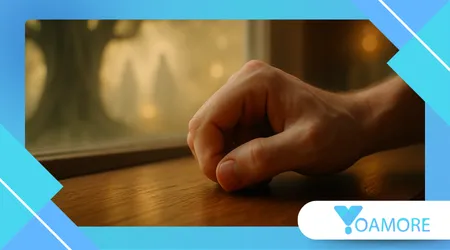Pourquoi touche-t-on du bois ? Les origines d'une superstition mondiale

Dès la première ligne, il convient de mentionner la phrase superstition de toucher du bois, un geste que l'on accomplit presque instinctivement après avoir exprimé un espoir ou voulu conjurer le mauvais sort.
Annonces
Qu’est-ce que la « superstition du toucher du bois » ?
Ce geste, qui consiste à tapoter légèrement sur du bois, est une simple habitude : après avoir prononcé une phrase positive ou porteuse d’espoir, on touche du bois pour conjurer le mauvais sort. Courant dans les cultures anglophones, il se retrouve également dans le monde entier.
Cet acte fonctionne à la fois comme une expression verbale et comme un geste physique : les deux servent à tenter de préserver la bonne fortune. En termes de référencement, le mot-clé superstition de toucher du bois doivent apparaître naturellement et uniformément dans tout le texte, comme on le voit ici et dans chaque section.
Comment les civilisations anciennes expliquaient les catastrophes naturelles
D'où vient cette superstition ?
Il existe plusieurs théories, aucune n'étant entièrement définitive, mais certaines reposent sur de solides fondements historiques.
Racines païennes et arbres sacrés
L'une des explications les plus largement acceptées rattache cette coutume aux anciennes tribus celtes et germaniques, qui croyaient que les arbres étaient habités par des esprits ou des dieux.
Annonces
Frapper ou toucher du bois pouvait être une façon d'invoquer sa protection ou d'exprimer sa gratitude pour la bonne fortune.
Des chercheurs de Histoire Il convient de noter que « les arbres étaient considérés comme les demeures des esprits ».
De la même manière, Comment ça marche souligne que « frapper ou toucher un arbre était une façon de demander la bonne fortune aux esprits bienveillants ».gens.com)
Interprétation chrétienne
Une autre théorie relie cette pratique au christianisme, où le bois de la croix de Jésus-Christ symbolise la protection divine ; ainsi, « toucher du bois » serait devenu un geste invoquant cette protection sacrée.
Cette interprétation apparaît fréquemment dans les études qui débattent de la question de savoir si ce geste relève de la pure superstition ou d'un héritage religieux symbolique.
Les jeux d'enfants et le XIXe siècle
Une troisième théorie évoque les jeux d'enfants du XIXe siècle, comme Tiggy Touchwood Au Royaume-Uni, toucher du bois signifiait être à l'abri des insultes. Au fil du temps, cette idée de « sécurité » et de « protection » a peut-être évolué vers le rituel de superstition de toucher du bois.
Ses origines pourraient donc mêler des influences païennes, religieuses et ludiques, pour finalement se fondre dans l'une des habitudes les plus répandues au monde.
Pourquoi ouvrir un parapluie à l'intérieur porte malheur
Comment cette superstition se manifeste-t-elle à travers le monde ?
L'expression et la gestuelle varient selon la culture, la langue et même le matériau. Voici quelques exemples notables :
| Pays/Région | Expression locale | Détail curieux |
|---|---|---|
| Royaume-Uni | "Toucher du bois" | Utilisé plus souvent que « toucher du bois » en anglais britannique. |
| États-Unis | « Touchons du bois » | La version la plus courante dans la culture nord-américaine. |
| Brésil/Portugal | « Bater na madeira » (« toucher du bois ») | Cela implique souvent trois petits coups, parfois sans paroles. |
| Turquie | « Tahtaya vurmak » | Cela consiste généralement à se tirer le lobe de l'oreille et à frapper deux fois. |
| Italie | « Tocca ferro » (« toucher le fer ») | Remplace le bois par du fer pour la protection. |
Remarquez comment le « bois » peut parfois être remplacé par d'autres matériaux comme le métal, selon la tradition. La présence mondiale de ce rituel montre que superstition de toucher du bois Ce phénomène ne se limite pas à une seule culture, mais reflète un besoin humain universel de « toucher » la chance elle-même.
Pourquoi existe-t-il encore en 2025 ?

Malgré l'essor de la science, du rationalisme et de la laïcité, toucher du bois reste profondément ancré dans la vie quotidienne. Pourquoi ?
1. La psychologie du contrôle
Quand quelqu'un dit : « Je n'ai pas été malade de toute l'année », et touche immédiatement du bois, il éprouve un sentiment de maîtrise face à l'incertitude.
Expériences issues de Université de Chicago cité par Comment ça marche L’étude a révélé que les participants qui effectuaient une action physique après une déclaration positive se sentaient moins anxieux à l’idée de « défier le destin ». Ce geste procure un réconfort psychologique dans les situations imprévisibles.
2. Rituel social et culturel
Toucher du bois est une expression courante dans les conversations informelles et les plaisanteries. C'est un signe partagé de vigilance : « J'ai eu de la chance, il ne faut pas la porter malheur. » C'est devenu davantage un rituel social qu'une croyance littérale.
Son adaptabilité garantit que chaque culture remodèle l'acte à sa manière, permettant superstition de toucher du bois pour rester pertinent.
3. Culture populaire et marketing
L'expression « toucher du bois » est apparue dans des titres de chansons, des films et des slogans publicitaires. Cette présence dans la culture populaire perpétue cette habitude comme symbole culturel, même chez ceux qui ne croient pas à la chance.
4. De la superstition à l'habitude
Au fil du temps, cet acte est passé de la croyance au comportement. Nombreux sont ceux qui ne l'associent plus aux esprits ou à la protection divine ; ils le font simplement « au cas où ». Comme l'explique TED-Ed, « d'une manière ou d'une autre, cette tradition a survécu bien après que la croyance en ces esprits se soit estompée ».blog.ed.ted.com)
Ainsi, le superstition de toucher du bois Elle perdure car elle allie une conscience rationnelle à une touche d'irrationalité réconfortante.
+Bâtiments célèbres conçus pour éloigner les mauvais esprits
Conclusion
En substance, le superstition de toucher du bois Cela représente bien plus qu'une simple habitude anodine ou ludique. C'est un rituel profondément ancré dans la psyché humaine, reliant l'ancien au moderne, le rationnel au mystique.
Sa persistance à travers les siècles démontre comment les pratiques culturelles évoluent — non pas en restant statiques, mais en s'adaptant à de nouvelles significations et à de nouveaux contextes tout en préservant leur essence émotionnelle.
Initialement liée à d'anciennes croyances païennes selon lesquelles des esprits vivaient dans les arbres, cette coutume a progressivement absorbé un symbolisme religieux et s'est transformée plus tard en un geste universel de modestie, de protection et d'humilité face au destin.
Chaque génération redéfinit sa finalité : ce qui invoquait autrefois une protection divine procure désormais un réconfort psychologique et un lien social. Cette évolution reflète le besoin constant de l’humanité de donner un sens à l’incertitude et au hasard dans un monde complexe.
La psychologie moderne soutient l'idée que les rituels comme superstition de toucher du bois contribuer à réduire l'anxiété et à renforcer le sentiment de contrôle, notamment face à l'imprévu.
Les gens aspirent à la prévisibilité, et même de petits gestes symboliques peuvent apaiser l'esprit. En ce sens, l'acte transcende la superstition : il devient un outil cognitif, un mécanisme d'adaptation déguisé en tradition.
Culturellement, ce geste fonctionne aussi comme un langage commun. Dire « touchons du bois » transcende les générations, les origines et les croyances ; cela exprime un optimisme teinté de prudence.
On peut l’entendre dans une salle de réunion, un vestiaire sportif ou un dîner de famille, chaque fois porteur d’un rappel subtil : « Ne tenez pas votre bonne fortune pour acquise. » L’universalité de ce message explique pourquoi cette pratique perdure à l’ère numérique, où l’incertitude domine encore le quotidien malgré notre maîtrise technologique.
De plus, ce geste témoigne d'humilité. C'est reconnaître, en toute simplicité, la fragilité du succès, de la chance et de la santé ; et qu'un peu de respect pour l'inconnu nous permet de garder les pieds sur terre.
Cet équilibre entre confiance et prudence confère à la superstition une profondeur émotionnelle. Elle ne se contente pas de « protéger » les gens ; elle enseigne la gratitude, la conscience et la beauté de ne pas tout savoir.
Alors, la prochaine fois que vous vous surprendrez à déclarer que quelque chose vous est favorable — une promotion, un coup de chance ou une période de bonne santé —, faites une pause d'un instant, souriez et… touchons du bois.
Cela ne changera peut-être pas le destin, mais cela vous relie à des milliers d'années de tradition humaine, unissant les anciens adorateurs, les croyants du Moyen Âge et les sceptiques modernes dans un moment d'espoir partagé et silencieux.
En fin de compte, le superstition de toucher du bois Elle perdure car elle capture quelque chose d'intemporel : notre refus de nous soumettre entièrement au hasard. Il ne s'agit pas de magie, mais de sens.
Et dans un monde où tant de choses semblent incertaines, ce petit robinet en bois continue de résonner — un battement de cœur de foi déguisé en habitude.
Questions fréquemment posées
Q : Toucher du bois permet-il vraiment d'éviter la malchance ?
A : Scientifiquement, rien ne prouve que cela change les résultats. Pourtant, cela procure un soulagement psychologique — un acte symbolique qui contribue à rassurer les gens.
Q : Pourquoi certaines cultures touchent-elles le métal plutôt que le bois ?
A : Les variations locales adaptent l'objet à la tradition. En Italie, par exemple, on utilise le fer rouge plutôt que le bois comme matériau censé éloigner le malheur.
Q : Est-ce lié à la religion ?
R : Dans certaines interprétations chrétiennes, oui — c'est lié au bois de la croix. Dans d'autres traditions, cela remonte aux croyances préchrétiennes en des esprits des arbres.
Q : Est-ce encore de la superstition ou simplement une habitude culturelle ?
A : Les deux sont possibles. Certains croient sincèrement que cela éloigne le mauvais sort ; d’autres le font par jeu ou par habitude. Sa persistance tient à cette double signification.
